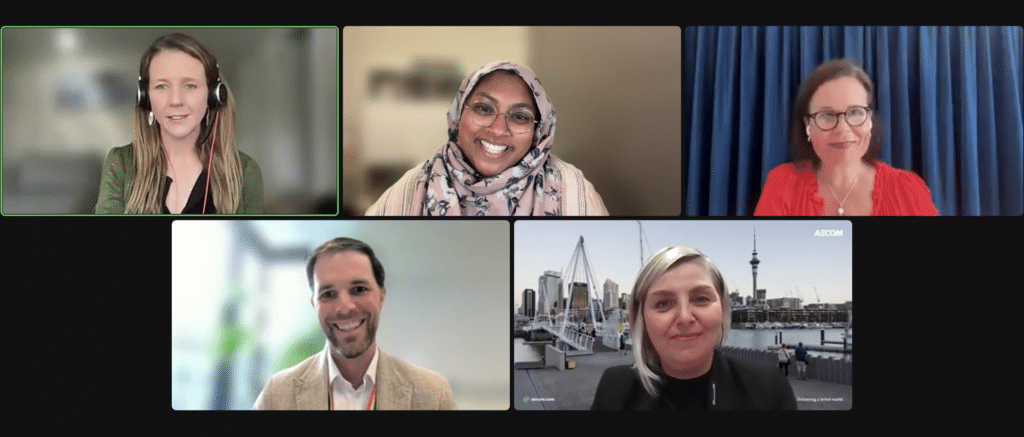What comes to mind when you think about sponsorship?
For Rana Hussain, Founder and CEO of Good Human, sponsorship is a “career-making” endeavour rooted in the active intention of championing another person within an organisation.
“I’m a visual person so I really see someone climbing up a mountain and being pulled up by the other person and doors opening up for them,” Hussain shared on Tuesday in a webinar on sponsorship, run by Women’s Agenda and Cultivate Sponsorship.
So what is sponsorship?
Founder of Cultivate Sponsorship, Katriina Tähkä, told the webinar that sponsorship is best described as an intentional act when someone has a seat at the table and they use it to create a pathway for another person’s career.
“As Rana mentioned, your career can feel like a mountain, but the reality is that when someone does that, the mountain gets smaller. It actually just creates a much easier pathway through the organisation,” Tähkä said.
Often, it can take years to build a sponsorship relationship like this organically in a workplace, but through Cultivate Sponsorship’s programs, organisations can establish structured sponsorships between two people who are strategically paired.
Two individuals who have been through the Cultivate program are Lynsey Dyer, Associate Director and Design Manager at AECOM New Zealand, and Mark McManamny, CEO of AECOM ANZ.
As CEO of AECOM ANZ, McManamny said he is able to use his position as a sponsor to be deliberate about the progression of other people’s careers, and identify opportunities for women working in the business. It’s something he’s done as Dyer’s sponsor.
“Sponsorship for me is a great way for us to disrupt bias, a great way for us to accelerate careers, and a great way for us to really create that diverse organisation that we know delivers much better results for us overall,” McManamny told the webinar.
For Dyer, being matched in a sponsorship relationship with McManamny came after she was put forward to participate in the program. She says it was an exciting opportunity to reflect on her career goals with a trusted, senior colleague.
“It was a good opportunity to take that plunge and really start to think about what I wanted out of my career,” Dyer said. “A lot of the time you don’t really get a chance to stop and really reflect and discuss that with someone that’s really quite impartial to your immediate career.”
So what else should you know about sponsorship? Here are some of the key takeaways from our panellists:
Get intentional about your ambition
If the road to sponsorship is not clear cut in your organisation, Tähkä encouraged women to get loud about their ambitions and to work to create networks of people that are willing to listen.
“Get a bit louder about your ambition. If it’s in your head and no one knows, no one is going to talk about it,” Tähkä said.
“Often people do these amazing 90-degree turns and try something different, but you’re not going to do that if someone’s not backing you. So de-risk all of that by speaking up about your ambition in a really thoughtful, authentic way, and people will listen.”
Dyer agreed, and said the first port of call could be to raise the idea of sponsorship with your manager.
“Just say, ‘hey, I’ve been thinking about sponsorship. What do you think? Is there someone that you could put me in touch with’,” Dyer said.
“It’s about having those conversations and trying to work it into your goals.”
Sponsorship is key to cutting through bias and systemic barriers
As Rana Hussain noted in the webinar, systemic organisational and cultural realities can often mean that women of colour, or women of any kind of intersection, are overlooked for career progression and promotions, regardless of how hard they try.
She noted the power of sponsorship to help women overcome these structural issues and have their career ambitions taken seriously.
“Sponsorship is one of those things that I’ve seen that’s a really practical way to just cut through, and bring people forward and shine a light on them… and get to the point where they are seen and heard and get spoken about,” Hussain said.
Sponsorship should be a partnership of two equals
While every organisation has inherent power dynamics at play, it’s critical that sponsorship relationships are built between two people who see each other as equals. A key part of this is developing a sense of trust, as noted by Mark McManamny.
“One of the great things about the program from my perspective was the ability for it to accelerate trust between a sponsor and the sponsee. For sponsorship to really work you need a really great understanding of each other,” McManamny said.
Hussain also noted that it is imperative organisations engage in conversations about power dynamics, and how this might impact sponsorship.
“It’s about having that conversation. How are we going to build trust?” Hussain said. “It’s about framing the sponsorship relationship as a coming together of equals.”
Sponsorship can help leaders engage in self-reflection
As McManamny highlighted, being a sponsor allowed him to self-reflect and learn about the experiences of others working within the same business.
“The sponsoring experiences allowed me to reflect on myself and to hold a mirror up, and to build some empathy and to build some reflections on the experience, the experiences of other people and how that can then inform you in your role as a leader,” he explained.
“Once you have that understanding of that individual – understand their desires, their strengths, their opportunities – you can then start to talk about what those opportunities might look like.
“It’s not just a one way strategy of sharing information. It needs to go both ways.”
You can find out more about Cultivate Sponsorship here.


